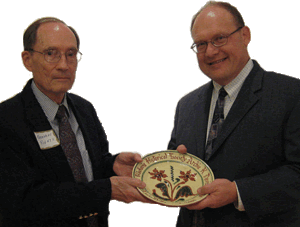
The Rt. Rev. Graham Rights (left) presents the 2010 Archie K. Davis Award to Dr. Craig Atwood (right).
“So, soon thereafter, when I was wondering why the Filioque Clause was left out of the Nicene Creed in the 1969 Moravian Hymnal and Liturgies, I went again to the same source, and he replied, “I’ve written a paper about that, too” – he actually had written two papers about it and sent me copies of both. Again, in case you are interested, his conclusion was that “the filioque was omitted from the Nicene Creed as a nod to a supposed historical continuity between the Unitas Fratrum and the Orthodox Church which in fact did not exist.” He added, however, that “the omission is thoroughly consistent with Moravian theology, liturgy and tradition.” And if you want to know what the Filioque Clause was, see our honoree or me after the meeting.
That was the beginning of consultations I have had with Brother Craig Atwood that continues to this day.
“For the past 16 years we have had the privilege of having Craig with us in this area, where he has been a constant source of enlightenment regarding the context of Salem and Wachovia in the wider history of the Moravian Church. As Chaplain of Salem College from 1994 to 2002, Theologian in Residence at Home Moravian Church from 2002 to 2009 which included many classes in Moravian subjects and teaching the Adult Bible Class broadcast weekly to the community, and as Director of Public Theology Programs 2005-2009 and John Comenius Adjunct Professor of Moravian Studies 2005-2010 both at Wake Forest Divinity School, he has increased awareness of this wider context not only for Moravians and but also for others in our community.
“Dr. Craig Atwood’s preparations for his later service were through study at the University of North Carolina at Chapel Hill, where he received a Bachelor of Arts degree; Moravian Theological Seminary, Master of Divinity Magna Cum Laude; and Princeton Theological Seminary, Doctor of Philosophy in Historical Theology.
“Many have come to understand the Moravian story more fully from his various publications of a host of articles and papers and several books, including, Always Reforming: The History of Christianity Since 1300; Jesus Still Lead On: An Introduction to Moravian Belief; Community of the Cross: Moravian Piety in Colonial Bethlehem; and The Theology of the Czech Brethren from Hus to Comenius. This last mentioned and latest work, fills a void in works on Moravian Theology, in English at least, the last of which was published almost a century ago.
“This fall Craig moved to Moravian Theological Seminary in Bethlehem, Pennsylvania, to assume the new position of Charles D. Couch Associate Professor of Moravian Theology and Ministry and also to become Director of the Center of Moravian Studies located at the seminary. It is encouraging to know that now seminary students will benefit as he shares his learning, and there will be more opportunity for what we in this area have enjoyed to be experienced in the broader Moravian world.
“Craig is already being kept busy meeting demands for sharing his insights on Moravian history and theology, including delivering the annual Moses Lectures at the Seminary last Thursday on “Heretics, Pacifists, and Teachers: What We Can Learn from the Old Moravian Brethren,” and two days later on Saturday addressing the Conference on Moravian Music and History with “German Pietism and the Origin of the Black Church in America.” This very morning he met with the Seminary Trustees in Bethlehem.
“Tonight, however, we welcome Craig back to his native Winston-Salem in the heart of Wachovia where with great pleasure we present to him the Wachovia Historical Society’s Archie K. Davis Award for History.”
By The Rt. Rev. Graham H. Rights




